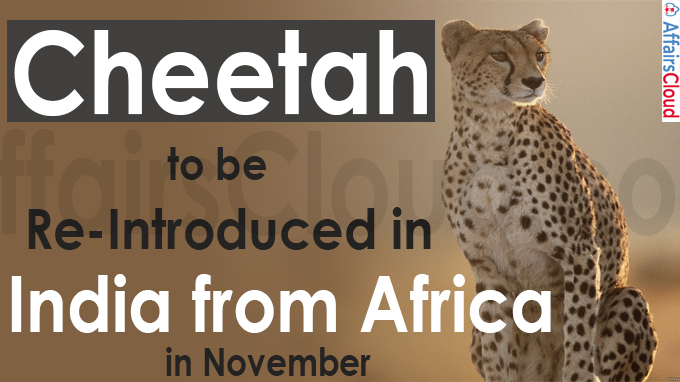 Cheetah, declared extinct in India in 1952 is set to be re-introduced into India in November, 2021 at the Kuno National Park, Madhya Pradesh (MP). It is the 1st time in the world that a large carnivore will be relocated from one continent to another.
Cheetah, declared extinct in India in 1952 is set to be re-introduced into India in November, 2021 at the Kuno National Park, Madhya Pradesh (MP). It is the 1st time in the world that a large carnivore will be relocated from one continent to another.
- As per the plan, 10 African Cheetahs will be brought from South Africa & Namibia and reintroduced in India.
- The Ministry of Environment, Forest and Climate Change (MoEFCC) has approved a budget of INR 1, 400 Lakh for the 2021 Fiscal under ‘Project Cheetah’.
- National Tiger Conservation Authority (NTCA) will release money for the project to Madhya Pradesh and the Dehradun-based Wildlife Institute of India (WII) in June, 2021.
- India’s last Cheetah died in Chhattisgarh in 1947.
Three-Member Panel formed by Supreme Court
i.In January 2020, the Supreme Court approved the proposal to introduce African Cheetah to a suitable habitat in India on an experimental basis.
- It set up a three-member committee, composed of Ranjit Singh, Former Director of WII; Dhananjai Mohan, Director of WII; DIG, Wildlife, MoEFCC to guide the NTCA.
- It was tasked with carrying out a technical evaluation of all possible sites for the reintroduction of Cheetah in India.
- Experts from South Africa along with WII visited four locations in Madhya Pradesh, out of which Kuno National Park was selected.
ii.In 2014, WII had proposed a INR 260 Crore project for reintroducing Cheetah in Nauradehi wildlife sanctuary in Madhya Pradesh.
Kuno National Park
It is located in the Chambal region of Madhya Pradesh and has a conducive environment for the Cheetah .
- It has a considerable population of antelopes, nilgai, wild boar, spotted deer which are a good prey base for the cheetahs.
Conservation Status of Cheetah
They are listed as ‘Vulnerable’ by the International Union for the Conservation of Nature (IUCN) Red List of Threatened Species, with a declining population of less than 7,000 found primarily in African savannas.
Recent Related News:
On December 21, 2020, Union Minister for MoEFCC Prakash Javadekar released the ‘Status of Leopards in India, 2018’ report, which states that India has recorded a 60% rise in Leopard population across India and it now has 12, 852 Leopards.
Madhya Pradesh recorded the most number of leopards.
About Wildlife Institute of India (WII)
An Autonomous Institution of the Ministry of Environment, Forest and Climate Change (MoEFCC)
Chairman – Secretary, MoEFCC (R P Gupta)
Headquarters – Dehradun, Uttarakhand




